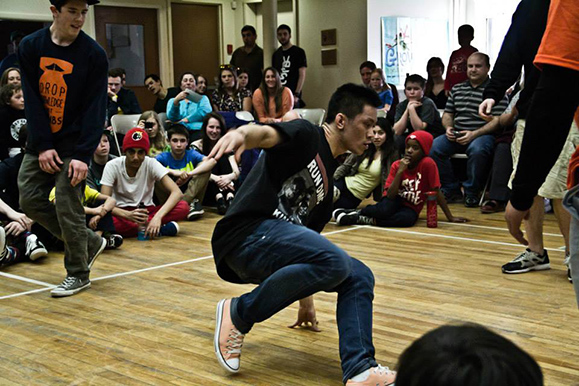 ‚ÄúThis is a little embarrassing for me,‚ÄĚ Nick Nguyen says with a laugh. ‚ÄúA lot of the other breakers say, ‚ÄėOh I got into this dance by watching VHS footage or watching it in person.‚Äô I watched Step Up 2.‚ÄĚ
‚ÄúThis is a little embarrassing for me,‚ÄĚ Nick Nguyen says with a laugh. ‚ÄúA lot of the other breakers say, ‚ÄėOh I got into this dance by watching VHS footage or watching it in person.‚Äô I watched Step Up 2.‚ÄĚ
Yes, the talented breaker and founder of the Ľ∆…ę÷Ī≤• Breaking Society was inspired when he was about 15 by the sequel to a popular dance film starring a young Channing Tatum. ‚ÄúIt was interesting because I had no prior knowledge to what hip-hop dance was,‚ÄĚ he says. ‚ÄúThey were doing all of these things like ‚Äėpopping‚Äô or ‚Äėbreaking‚Äô or spinning on their heads.‚ÄĚ
After watching the movie, a friend happened to mention a jam (the breaking equivalent of a dance competition) that a local group was having. Wanting to check it out in real life, he stopped by and loved what he saw.
‚ÄúI was amazed, fascinated that these guys could do flips, that they were doing all of these intricate movements with their legs and bodies,‚ÄĚ says Nick.
Afterwards he approached one of the organizers about lessons. The following year he signed up for his first breaking classes with Concrete Roots as well as Halifax Dance. Concrete Roots is a local organization that provides after-school dance classes for youth with a main focus on breaking. (Breaking is often referred to as break dancing or B-boying but Nick prefers the term ‚Äúbreaking‚ÄĚ because it‚Äôs more gender-neutral.)
Pushing through the pain
Őż
His introduction to breaking came at a pivotal point for Nick. The typical tough times of being a young teen were compounded by issues at home. Breaking provided a welcome‚ÄĒif not physically challenging and painful‚ÄĒescape for him.
‚ÄúMy parents just separated and it was that time in junior high when your friend groups sort of dissipate and you‚Äôre trying to find what group you really belong to,‚ÄĚ he says. ‚ÄúSo, breaking for me was my bizarre form of meditation.‚ÄĚ
Breaking still provides a source of meditation for Nick today. To add to the emotional stress Nick was already experiencing, some of his family members didn‚Äôt provide him with a lot of support for his new passion. They disparagingly called it a ‚Äúghetto dance‚ÄĚ and told him it wasn‚Äôt ‚Äúclassy.‚ÄĚ And many of his friends weren‚Äôt much better‚ÄĒwhich was particularly difficult at an age where maintaining friendships is tough enough.
‚ÄúI had a lot of friends that would say, ‚ÄėYou look absolutely ridiculous.‚Äô But I kind of just pushed through it,‚ÄĚ he says. ‚ÄúI really like doing this and this isn‚Äôt really for them, which I finally realized. Then I just overcame that.‚ÄĚ

His family and friends eventually came around, particularly when he started volunteering and teaching others. It boosted his confidence and showed the skeptics some of the other benefits of breaking.
‚ÄúMost people really don‚Äôt know that much about hip-hop,‚ÄĚ says Nick. ‚ÄúWhat they saw were the depictions in the media that breaking is associated with hip-hop and hearing all of these hip-hop songs that are like, ‚Äėsex, drugs, and money.‚Äô ‚ÄĚ
Now teaching his own classes, Nick is trying hard to change this popular misconception and educate people about the depth of hip-hop culture‚ÄĒthat it‚Äôs about more than just the music and dancing.
‚ÄúI taught with Dance Nova Scotia over the summer and I asked the kids what they knew about hip-hop,‚ÄĚ he says. ‚ÄúMost of them think it‚Äôs just a genre of music or being gangster. Now I‚Äôm trying to switch that around. Hip-hop is actually something really positive as apposed to negative. It just happened to be rooted in negativity in the form of things like racial oppression.
‚ÄúDance is just one element of hip-hop but real hip-hop is more complex‚ÄĒit‚Äôs a socio-political movement and culture that‚Äôs trying to share complex and intriguing history and knowledge, as well as encourage new art forms. It‚Äôs all about the idea that peace, love, and unity is equality and equity for everyone.‚ÄĚ
Anyone interested in taking up breaking can .
Video: Nick's Story
(produced by Tim Mombourquette)

